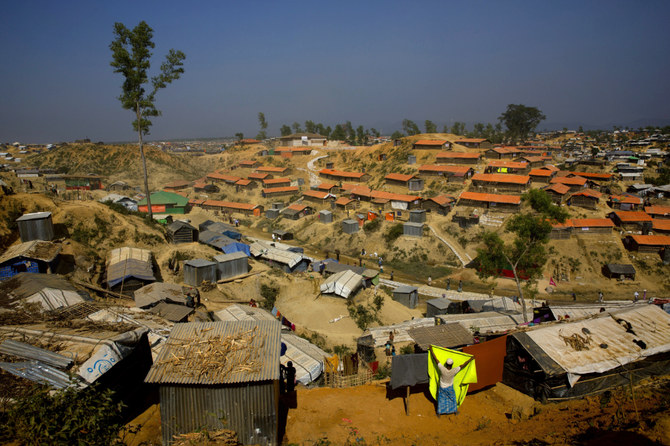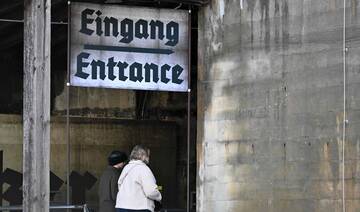DHAKA: Fading hopes for a future and the desire to be reunited with family are pushing increasing numbers of Rohingya to flee overcrowded refugee camps in Bangladesh and make perilous journeys across the Andaman Sea.
Bangladesh hosts more than 1.2 million Rohingya Muslims, most of whom escaped persecution in neighboring Myanmar during a military crackdown in 2017. The majority live in Cox’s Bazar district, a coastal region in the east of the country, which is now the world’s largest refugee settlement.
But the recent rescue of dozens of starving Rohingya who had spent more than a month adrift on a stricken boat, has shone a spotlight on the increasing number of people trying to leave the squalid camps of Cox’s Bazar and cross the Andaman Sea in search of a better life.
The boat was one of several such vessels to leave Bangladesh in late November. But just a few days into the journey, its engines failed and its occupants were left adrfit. Appeals to the governments of several countries to rescue them fell on deaf ears, and it was not until late December, as the boat entered Indonesian waters, that local fishermen answered the call.
FASTFACT
Number of refugees attempting to cross Andaman Sea up sixfold since 2020, UNHCR says.
Another boat was intercepted by the Sri Lankan navy and a third by a Vietnamese offshore company, which handed the refugees over to the Myanmar navy. It was not immediately clear what would happen to them.
In early December, the U. N. refugee agency UNHCR issued an alert about the “dramatic increase” in the number of people, mostly Rohingya, attempting to cross the Andaman Sea from both Bangladesh and Myanmar. It estimated there had been a sixfold rise since 2020 and that at least 119 people had died making such crossings.
The figures did not include those who the rescued refugees said had been on the boats that left Cox’s Bazar in November but were now missing at sea, presumed dead.
“Since 2018, every year we have been noticing an increasing trend of Rohingyas taking perilous journey across the sea during November to February as the sea is calm and quiet in this period,” Asif Munir, an immigration and refugee affairs analyst, told Arab News.
For most, the dangerous crossings are the only option available to escape the limbo they face in Bangladesh.
“They are only receiving some food aid while living in the refugee settlements, but there are no other activities,” Munir said.
“Children are deprived of a proper education, they (the adults) are not allowed to engage in any productive work. These issues make the Rohingya desperate to leave.
“It’s been a long time they are living in the camps and on the other hand the repatriation process also seems to be uncertain.”
Despite multiple attempts from Bangladeshi authorities, a U.N.-backed repatriation and resettlement process in operation for several years has failed to tackle the problem, with only a handful of refugees being allowed to relocate.
At the same time, economic pressures on the South Asian nation, which despite not being a signatory to the 1951 UN Refugee Convention has taken in the biggest number of Rohingya asylum-seekers, are increasing. Hosting Rohingya costs Bangladesh an estimated $1.2 billion a year, while international aid for refugees has dropped since 2020.
Also, with the decreasing presence of foreign nongovernmental organizations in Cox’s Bazar, the number of opportunities for Rohingya to make a living there has diminished.
Rezuwan Khan, a Rohingya activist in Cox’s Bazar, whose sister was rescued off the Indonesian coast, told Arab News that many Rohingya had been laid off by the aid agencies that used to employ them.
“Many Rohingyas are desperate to flee the camps in search of a better life, better future, anywhere it’s possible,” he said.
Many are attempting to reunite with relatives who left earlier, mostly for Malaysia, where the people rescued by the Indonesia fishermen were initially bound.
“There are woman and children who want to be reunited with their husbands and fathers living in Malaysia. The men managed to reach Malaysia several years ago. This kind of people are desperate to leave the camps,” Khan said.
That desire is being exploited by traffickers who charge up to $5,000 for a place in one the boats leaving Cox’s Bazar.
“Rohingyas are risking their lives to save their lives,” said Mohammad Nur Khan, a Bangladeshi rights activist and expert on migration.
“In the camp, where most people are young, it’s living without any hope for the future. People aspire to a better life, it’s very natural.”
He added that the international community should do more to protect people from the traffickers, “so that the Rohingyas might be able to return to their homeland.”
“If we can’t keep this dream alive, the trafficking of the Rohingyas can’t be stopped.”
















